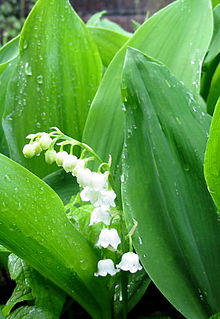müge
Appearance
Cimbrian
[edit]Etymology
[edit]Borrowed from Venetan muga, from Raetic *𐌌𐌖𐌊𐌖 (*muku, *mugu).
Noun
[edit]müge f
References
[edit]- Patuzzi, Umberto, ed., (2013) Luserna / Lusérn: Le nostre parole / Ünsarne börtar / Unsere Wörter [Our Words], Luserna, Italy: Comitato unitario delle isole linguistiche storiche germaniche in Italia / Einheitskomitee der historischen deutschen Sprachinseln in Italien
Turkish
[edit]
Etymology
[edit]Borrowed from French muguet, diminutive form of Old French mugue or muguete (“musk”), from muscade, from Latin muscada, feminine of muscat (“musky”), from Ancient Greek μόσχος (móskhos), from Middle Persian *mušk (“musk”), ultimately from Sanskrit मुष्क (muṣka, “testicle”), the shape of the gland of animals secreting the substance being compared to human testicles, a diminutive of मूष् (mūṣ, “mouse”), the shape of human testicles being compared to mice, from Proto-Indo-European *muh₂s (“mouse”).[1]
Pronunciation
[edit]Noun
[edit]müge (definite accusative mügeyi, plural mügeler)
Declension
[edit]
|
Synonyms
[edit]References
[edit]- ^ Webster's New World College Dictionary, Wiley Publishing, Inc., Cleveland, Ohio.
Categories:
- Cimbrian terms borrowed from Venetan
- Cimbrian terms derived from Venetan
- Cimbrian terms derived from Raetic
- Cimbrian lemmas
- Cimbrian nouns
- Cimbrian feminine nouns
- cim:Pines
- Turkish terms borrowed from French
- Turkish terms derived from French
- Turkish terms derived from Old French
- Turkish terms derived from Latin
- Turkish terms derived from Ancient Greek
- Turkish terms derived from Middle Persian
- Turkish terms derived from Sanskrit
- Turkish terms derived from Proto-Indo-European
- Turkish terms with IPA pronunciation
- Turkish lemmas
- Turkish nouns
- tr:Asparagus family plants
- tr:Flowers

